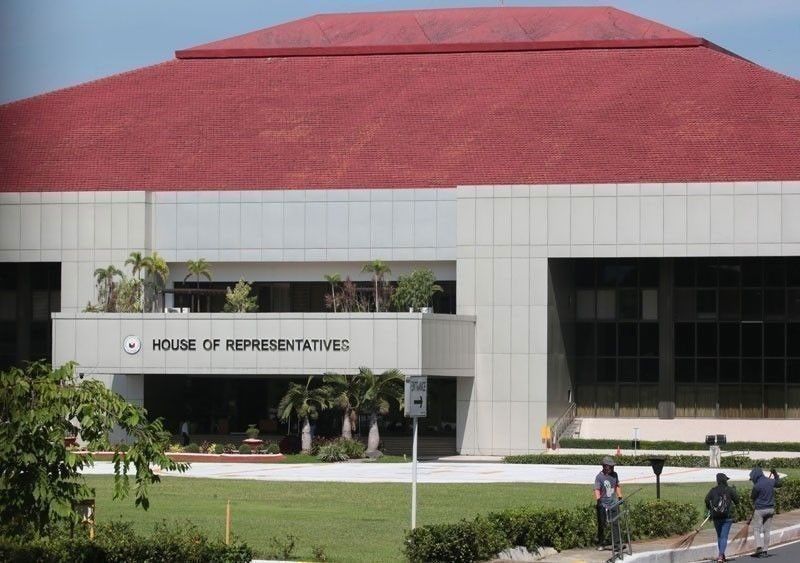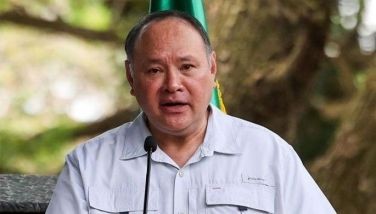House committee of the whole approves RBH7

MANILA, Philippines — The House of Representatives – acting as a committee of the whole – approved overwhelmingly yesterday Resolution of Both Houses No. 7, containing three proposed amendments to perceived restrictive economic provisions in the 1987 Constitution.
The committee voted to endorse the amendment proposals in RBH7, particularly amending provisions in the Constitution such as the grant of legislative franchises and ownership of public utilities in Article 12, ownership of basic educational facilities in Article 14 and the ownership of advertising firms in Article 16.
Deputy Majority Leader Neptali Gonzales II told reporters at a briefing that “plenary deliberations” will start on March 11 when the committee report will be reported out to House members, and RBH7 may be approved on second reading by March 13.
In six days of hearings, lawmakers heard the testimonies of resource persons including former Cabinet members, former lawmakers, academics, Filipino educators and professionals based abroad, former Supreme Court justices, economists and framers of the Constitution.
Gonzales, who was designated majority leader of the committee, moved to terminate the hearings.
The lawmaker from Mandaluyong City then presented a motion to approve RBH7, which embodies the proposed amendments.
Shortly after, Majority Leader and Zamboanga City Rep. Manuel Jose Dalipe, who was presiding over the hearing, declared the resolution approved.
Dalipe, Senior Deputy Speaker Aurelio Gonzales Jr. of Pampanga and Deputy Speaker David Suarez of Quezon, all principal authors of RBH 7, alternately presided over six days of marathon hearings that started last Feb. 26.
The House timeline set by Speaker Martin Romualdez vowed to finish economic amendments before Congress goes on a Holy Week break on March 23.
The resource persons that were invited yesterday were former senator Gregorio Honasan, former finance secretary Margarito Teves, Department of Foreign Affairs Undersecretary Jesus Domingo and Finance Undersecretary Rosemarie Edillon.
Honasan said lifting foreign ownership restrictions in the Constitution could contribute immensely to the country’s economic growth and that the Charter should be made to adapt to fast-changing global geopolitical, economic and technological conditions and developments.
At the same time, he said the proposed economic amendments, “together with policy reforms, will propel the Philippines to be on par with its neighbors in attracting foreign investments.”
“If we remain closed to foreign investors, then we will surely be losers. The Filipino will suffer,” Honasan said.
Teves said foreign equity limitations in the Charter “are binding constraints to investors” that are not present in the basic laws of other ASEAN countries like Singapore and Malaysia.
He said the Philippines has to adjust its “legal framework” to make it comparable with ASEAN neighbors and be competitive in enticing foreign investors.
Teves also advocated opening land ownership in rural areas to foreigners, subject to “data-driven” parameters Congress may prescribe.
He said the establishment of foreign-owned manufacturing plants in rural communities would provide job and livelihood opportunities to people in those areas and lead to economic development of the regions.
Rural residents seeking jobs would no longer have to migrate to Metro Manila and other urban areas, he said.
Meanwhile, the passage of RBH7 was opposed by five lawmakers who deemed it unnecessary and not beneficial to the Filipino people.
The opposing lawmakers were Camarines Sur Rep. Gabriel Bordado Jr., Albay Rep. Edcel Lagman and party-list representatives Raoul Manuel of Kabataan, France Castro of ACT Teachers and Arlene Brosas of Gabriela.
In explaining his vote, Bordado said the advocates of Charter change have been attributing the country’s “bleak economic situation to the supposedly antiquated and restrictive provisions of the Constitution” on foreign ownership.
“While our current grim economic condition calls for urgent responses, is Charter change the most immediate course of action we should pursue?” he asked.
Bordado noted RBH7 introduces the phrase “unless otherwise stated by law” into some economic provisions as “a solution to ease the restrictions set by the Charter.”
However, he underscored that “this fails to address the myriad other issues that adversely affect our economy and hinder our nation’s growth and advancement.”
He also pointed out that making the country “more attractive to foreign investors... without first addressing internal problems plaguing our systems renders all our efforts futile.”
For Brosas, the constitutional amendment is contradictory to the sense of the Constitutional Commission when it prohibited Congress from passing any law that will expand foreign equity shares in educational institutions in the 1987 Charter.
Brosas said this emphasizes that Filipino participation in education “can never be reduced to foreign equity.”
“This is a clear indication that the ConCom does not wish for Congress to meddle with the educational ownership provisions of the Constitution,” she added.
‘A big challenge’
All may be well between the Senate and the House of Representatives, but the passage of the Resolution of Both Houses No. 6 in the upper chamber remains a “big challenge,” Senate President Juan Miguel Zubiri said yesterday.
“We are back to what it was pre-PI (people’s initiative),” Zubiri told Senate reporters.
He, however, admitted that the passage of RBH6 seeking to amend specific economic provisions of the Constitution remains a challenge.
“I think the fight between our friends in the House here in the Senate is a factor, there is a trust issue. I mentioned that to the President,” he noted.
“We could still get 18 votes (for RBH6 to pass in the Senate) but at this point in time, it’s a challenge, but the commitment is discuss and debate upon the resolution… We are complying with our commitment to debate and discuss with the stakeholders. We have to make our case to our colleagues.”
Zubiri emphasized the importance of establishing rules in discussing the matter with Sen. Francis Tolentino, in filing Senate Resolution 941 which seeks to amend Senate rules to allow the amendment of the 1987 Constitution through the “fourth mode,” a formula devised by the late Joaquin Bernas, one of the framers of the Charter.
Under the Constitution, amendments to the Charter can be introduced through the constitutional convention, constituent assembly or people’s initiative.
“Bernas explained… the two houses of Congress are not required, as they were under the 1935 Constitution, to be in joint session. Hence, it is quite possible for the two houses to formulate amendments the way they formulate laws – as they are where they are,” the resolution stated. “Once one house is through with a draft, it is passed on to the other house for action.”
“If there is a prohibition, it can come either from the letter of the Constitution (and there is none) or from the fundamental structure of our constitutional government. Thus, for instance, the implicit prohibition of joint voting comes from the bicameral structure of Congress,” SR 941 added.
Education Cha-cha
“Education Cha-cha” or the proposal to amend the education sector in the Constitution would help lead the country from the labor-base phase to the innovation phase, according to Sen. Sherwin Gatchalian.
During the Kapihan sa Manila Bay forum yesterday, Gatchalian, chairman of the Senate committee on basic education, said the country can open the education sector and the benefits can be felt in five to 10 years.
“So if we listen carefully to the stakeholders, especially those who are advocating educational Cha-cha, we are looking at increasing research and development, producing more students or more graduates,” Gatchalian said.
“With this workforce, we can level up our economy from a labor-intensive economy to a knowledge-based and innovation phase front. We need to create the building blocks and one of the building blocks is knowledge training,” he said.
Gatchalian noted that many stakeholders who are not in favor of the education Cha-cha feared that basic education in the hands of foreign institutions would impart a different kind of value, patriotism and nationalism from the Filipino brand. – Sheila Crisostomo, Cecille Suerte Felipe
- Latest
- Trending





























